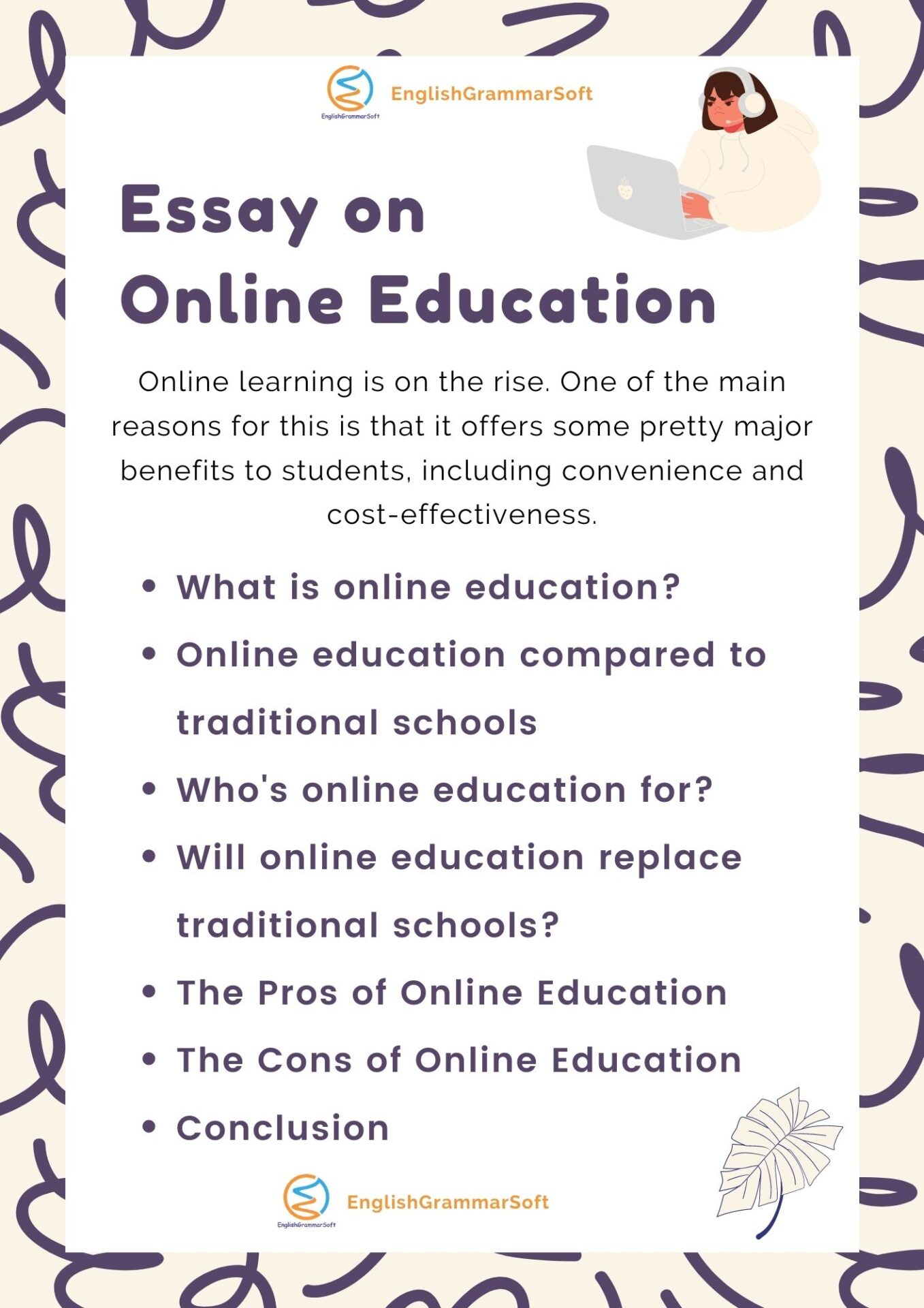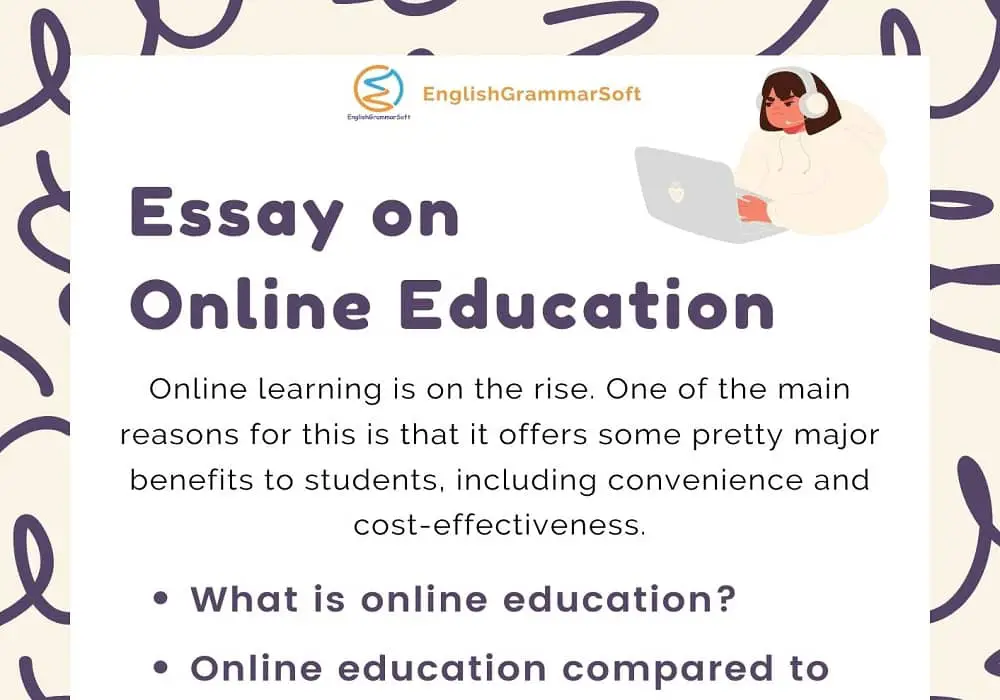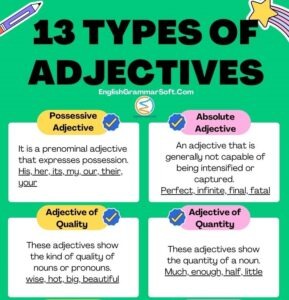Essay on online education (Pros & Cons)
Essay on online education: Online education has exploded in popularity, with over 20 million students taking at least one online course. Since its inception, many have questioned whether or not online learning is the future of education.
While proponents claim that online learning is more efficient, affordable, and convenient than traditional classrooms, skeptics point out that online courses are less interactive and don’t promote social skills.
What is online education?
Online learning is on the rise. One of the main reasons for this is that it offers some pretty major benefits to students, including convenience and cost-effectiveness.
For example, you can learn about anything from the comfort of your own home, at any time of day or night. You can also do so at your own pace.
This means you won’t have to worry about missing out on class time if you need to take care of other responsibilities first.
Online learning also offers some major advantages for parents who are looking for an alternative to public school education. Keep on reading to learn more about the benefits of online learning and how it might be right for you!
Online education compared to traditional schools
Let’s take a look at the pros and cons of online education to gain a better understanding of what online education has to offer.
Online education is more accessible to students than ever before. With the number of people learning online increasing exponentially, there are more options for people who want to take an online course. The students who are most likely to be taking online courses are younger and often underserved by traditional schools.
Online classes are a great option for students who want to earn a certificate or two-year degree, but are unable to attend traditional classes due to financial constraints, work schedules, or travel.
Online learning is often believed to be more efficient than traditional classrooms.
Still, some people have concerns about the quality of an education that doesn’t have a physical presence. In addition, some worry about the lack of human interaction with peers and professors.
Who’s online education for?
The reasons why some people are interested in taking online courses are numerous. Some are looking to make extra money, have the freedom to schedule their days around their work and family commitments or want to earn more experience in a field they’re already familiar with.
Online courses can be online classrooms. These are open online courses that are given through an approved institution or university. Students are able to take online courses for an undergraduate or graduate degree, or an internship.
If you are looking for freedom of schedule, time, and in some cases even money, online education is for you.
Will online education replace traditional schools?
Although many argue that the future of education is online, there are some things to consider before making the leap to an online education program.
Obviously, if you enroll in a course for its convenience or fun factor, it’s unlikely that you will apply yourself as effectively as if you were enrolled in a traditional class.
To determine the best course for you, you should first determine what you want out of your education. If you are taking the course for fun or for research purposes, you may not be focused enough to learn effectively.
If you are interested in making money, you may need a different kind of course. As students learn new skills and expand their knowledge, they develop new interests that they can pursue after the course is over.
The Pros of Online Education
As online learning continues to grow, some argue that it represents a promising alternative to traditional classrooms. While these views are far from universal, what is clear is that the benefits of online education are certainly worth exploring.
The number one reason that most people enroll in online courses is that they are convenient and easy to access. Students can log in at their own schedule, take the course at their own pace, and even save it to the hard drive of their computer to be taken home to study at their leisure.
It’s no surprise that millions of students utilize this convenient method of learning. For traditional classes, it can often cost hundreds of dollars per course to pay for all of the required materials for the course.
The Cons of Online Education
Because online education can be a little more challenging, students can experience online courses that include a lot of information but are difficult to digest.
Students who are less proficient with communication are likely to have difficulty sharing their ideas. In addition to these problems, online classes often lack focus, as the tasks presented to students become more and more difficult, they start to procrastinate, and the quality of the education will suffer.
Moreover, there is less human interaction with professors and peers.
Conclusion
The benefits of online learning can be substantial, particularly when it comes to acquiring knowledge and gaining skills.
This dynamic opens up opportunities for anyone to reach more people and build their network. However, many question the efficacy of online learning because online courses don’t offer in-person instruction and students are missing out on social interaction, which helps them develop the ability to network and collaborate with others.
While the capabilities of online learning aren’t completely understood, it’s clear that online courses can produce a number of benefits when compared to traditional classroom-based methods.

More on essays
- How to Write an Essay | Structure of Essay (Comprehensive Guide)
- Essay on Happiness is a State of Mind
- Essay on Education
- Essay on importance of education
- An Essay on School Life
- Essay on Friendship
- Essay about Anxiety and Stress
- Essay on Time Management
- Essay on 7 Cs of Communication
- Essay on 8 Business Functions
- Essay on Social Media and Its Impact
- Essay on Personality Development
- Essay on Leadership
- Essay on Importance of water in life
- Essay on Pollution
- Essay on Environment Protection
- Essay on Corruption
- Essay on Why Trees are Important in our Life
- 500 Words Essay on Nature in English
- Essay on Global Warming Causes and Effects
- Essay on Deforestation
- Essay on Smoking is bad for health
- A Short Essay on Mothers Day
- Essay on Health is Wealth






